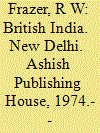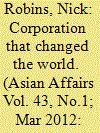| Srl | Item |
| 1 |
ID:
028761


|
|
|
|
|
| Publication |
New Delhi, Ashish Publishing House, 1974.
|
| Description |
xvi, 399p.: ill.hbk
|
|
|
|
|
|
|
|
|
|
|
|
Copies: C:1/I:0,R:0,Q:0
Circulation
| Accession# | Call# | Current Location | Status | Policy | Location |
| 013141 | 954.035/FRA 013141 | Main | On Shelf | General | |
|
|
|
|
| 2 |
ID:
116622


|
|
|
|
|
| Publication |
2012.
|
| Summary/Abstract |
For over 200 years the East India Company was the world's largest corporation. Set up as a merchant trading house in 1600, it became a permanent joint stock company in 1657, the forerunner of the modern multinational. The tension between investment and speculation was reflected in a share price which rose and fell with its fortunes. In the beginning bullion was brought from Britain to pay for Indian goods, which were then shipped to Britain. But in 1766, not long after Clive's victory at the battle of Plassey, the Company acquired the diwani, the right to collect the taxes, in Bengal. A situation of "unrequited trade" was thus established. Suddenly the profits from tax collecting more than covered the cost of trade goods. The dividend, jumped from six per cent in 1766 to 12 per cent in 1769. The shares soared. Then the Company's position in South India was threatened and the share price collapsed. The Company had overwhelming debts, but was judged "too big to fail". It had to be bailed out by the British government, which in return secured the right to nominate representatives to the Bengal Council. Corruption and accountability became increasingly important themes. By the time Warren Hastings was Governor-General the company was purchasing vast quantities of tea from China. What could be sold to China in return? Answer: Indian opium. This trade notoriously led to war with China. But by the end of the Second Opium War, the Indian Mutiny had put paid to the Company's rule over India, though the Company continued a financial existence until 1874.
|
|
|
|
|
|
|
|
|
|
|
|
|
|
|
|
| 3 |
ID:
032490


|
|
|
|
|
| Publication |
DelhI, Anmol Publications, 1985.
|
| Description |
348p.hbk
|
| Contents |
Vol. II
Set Price is Rs. 500
|
|
|
|
|
|
|
|
|
|
|
|
Copies: C:1/I:0,R:0,Q:0
Circulation
| Accession# | Call# | Current Location | Status | Policy | Location |
| 027431 | 954.031/FOR 027431 | Main | On Shelf | General | |
|
|
|
|